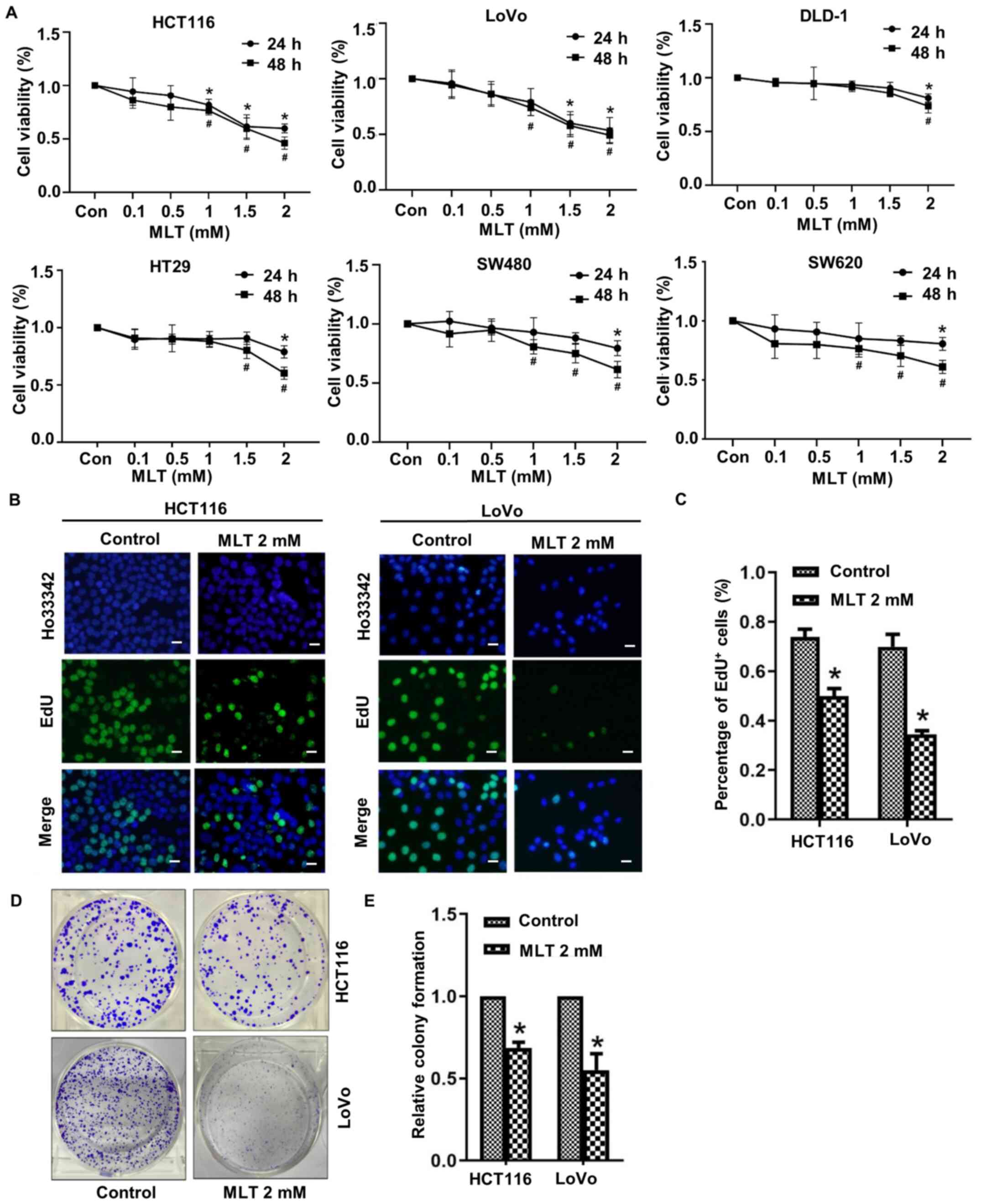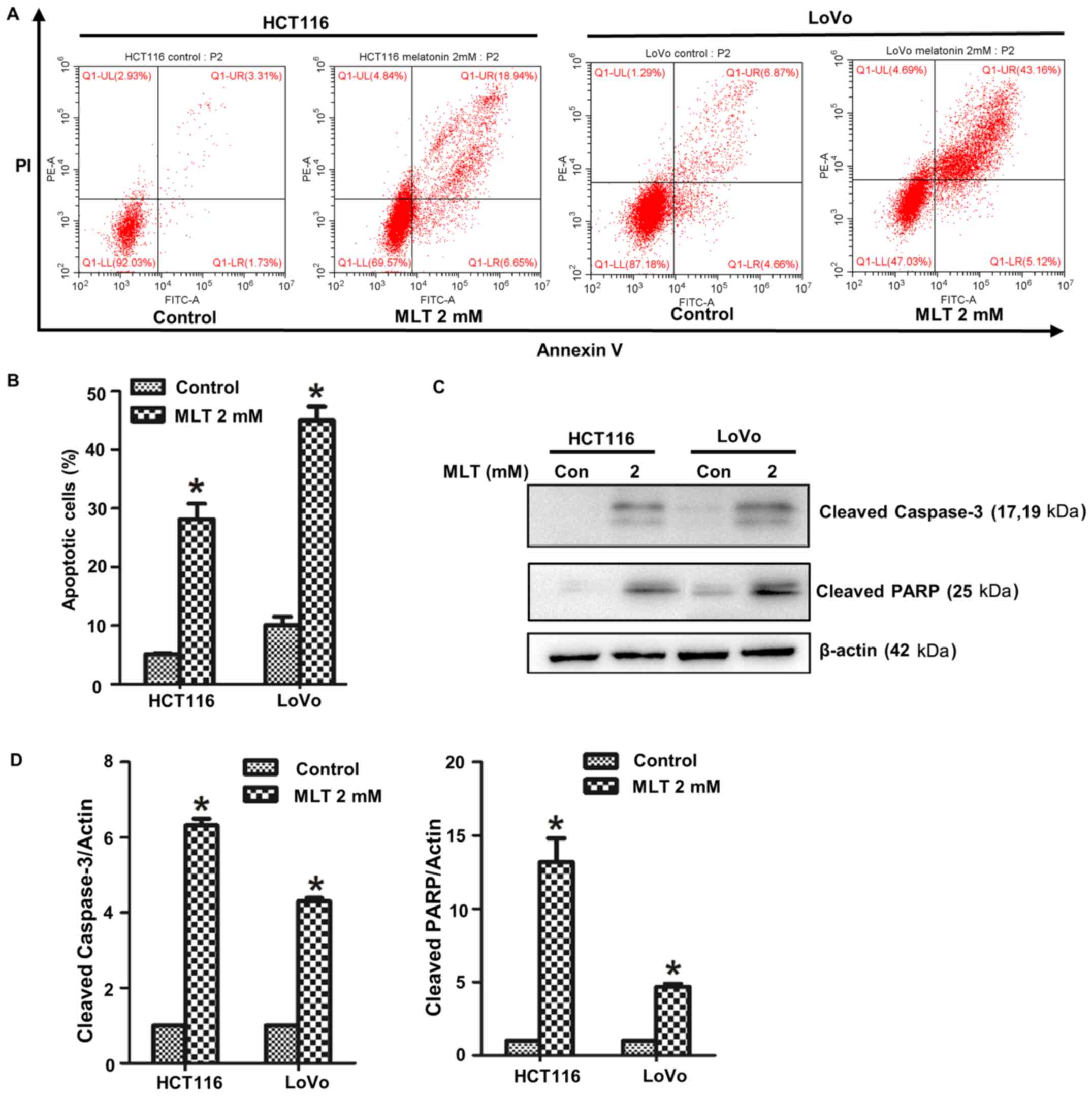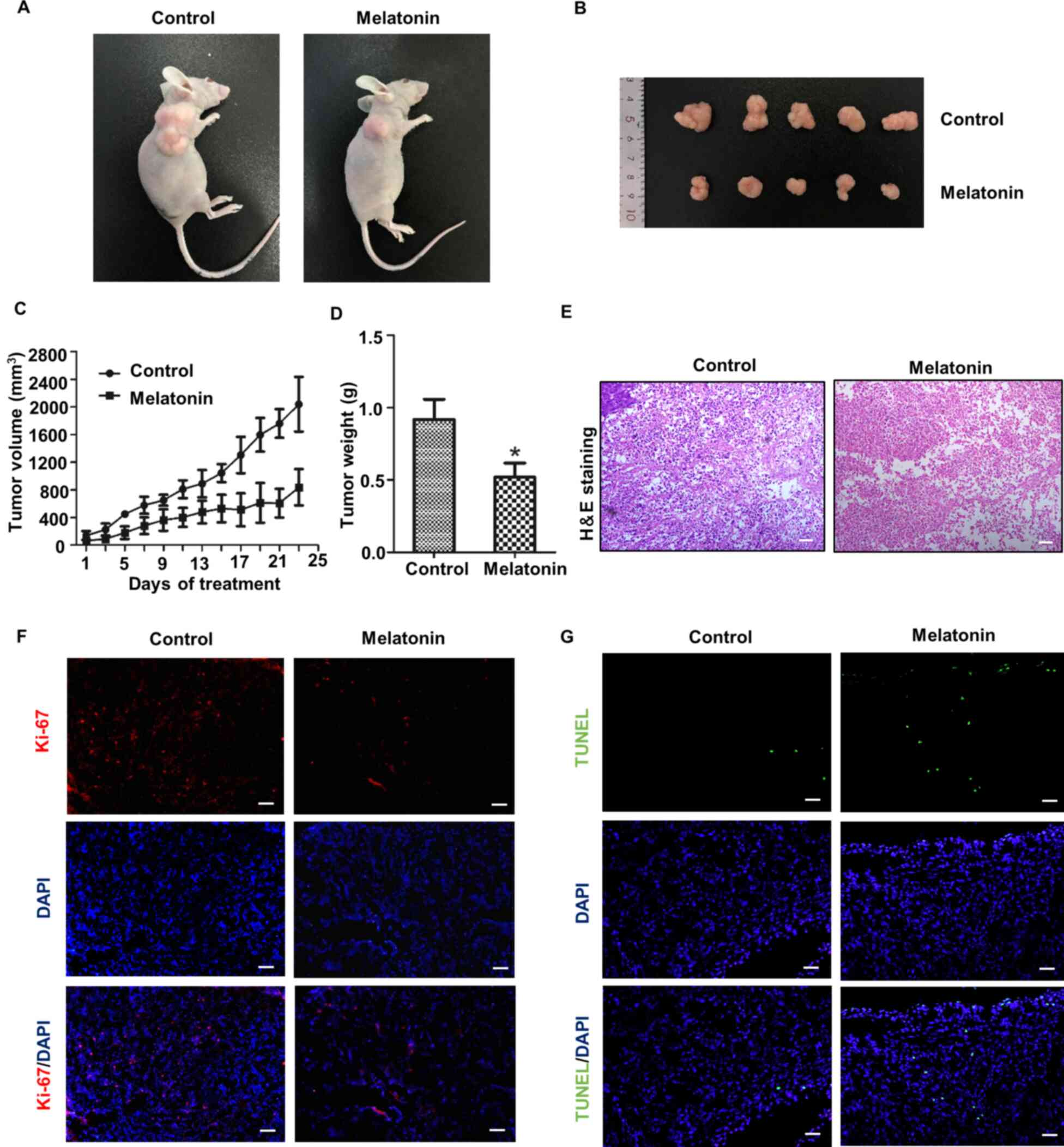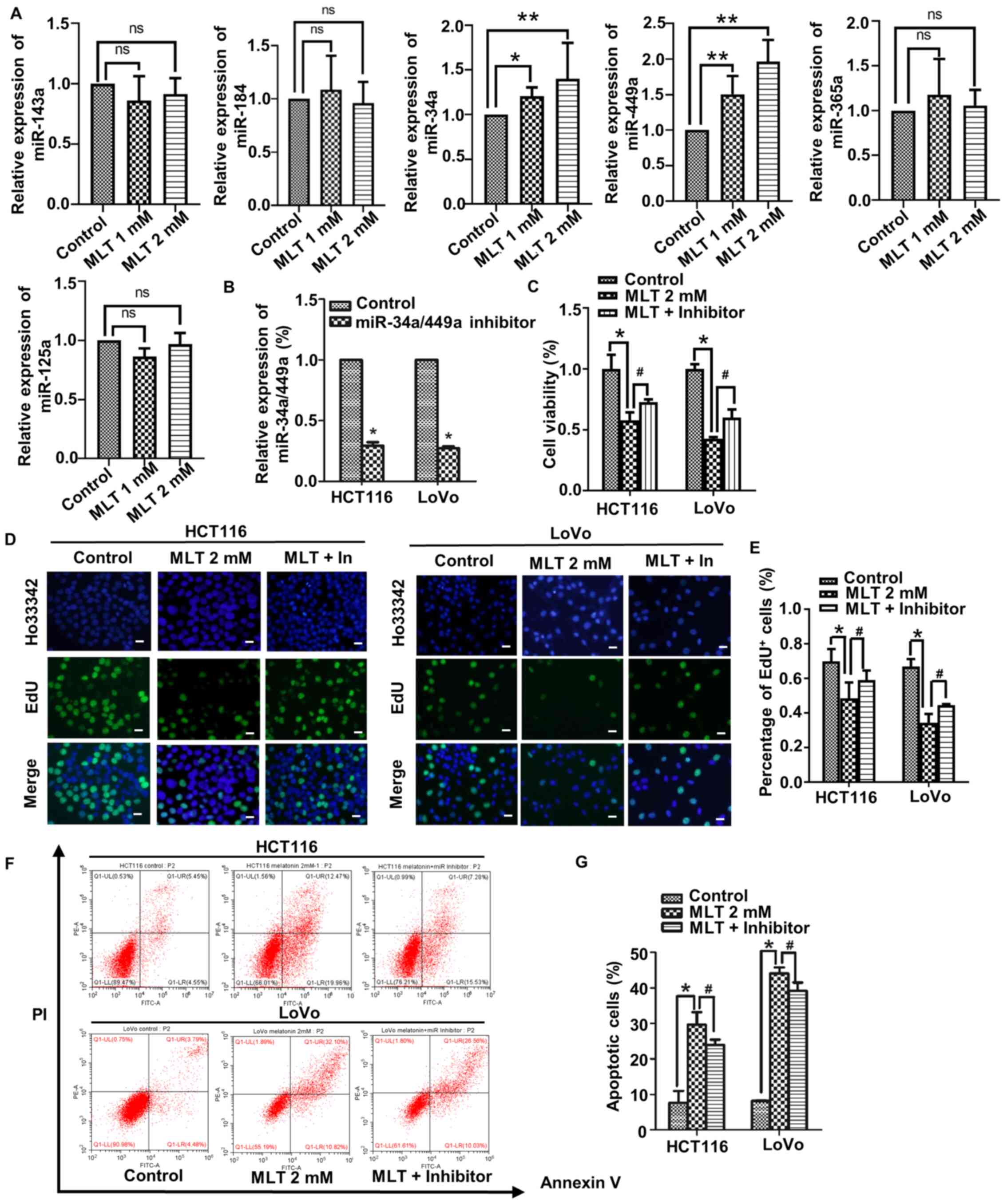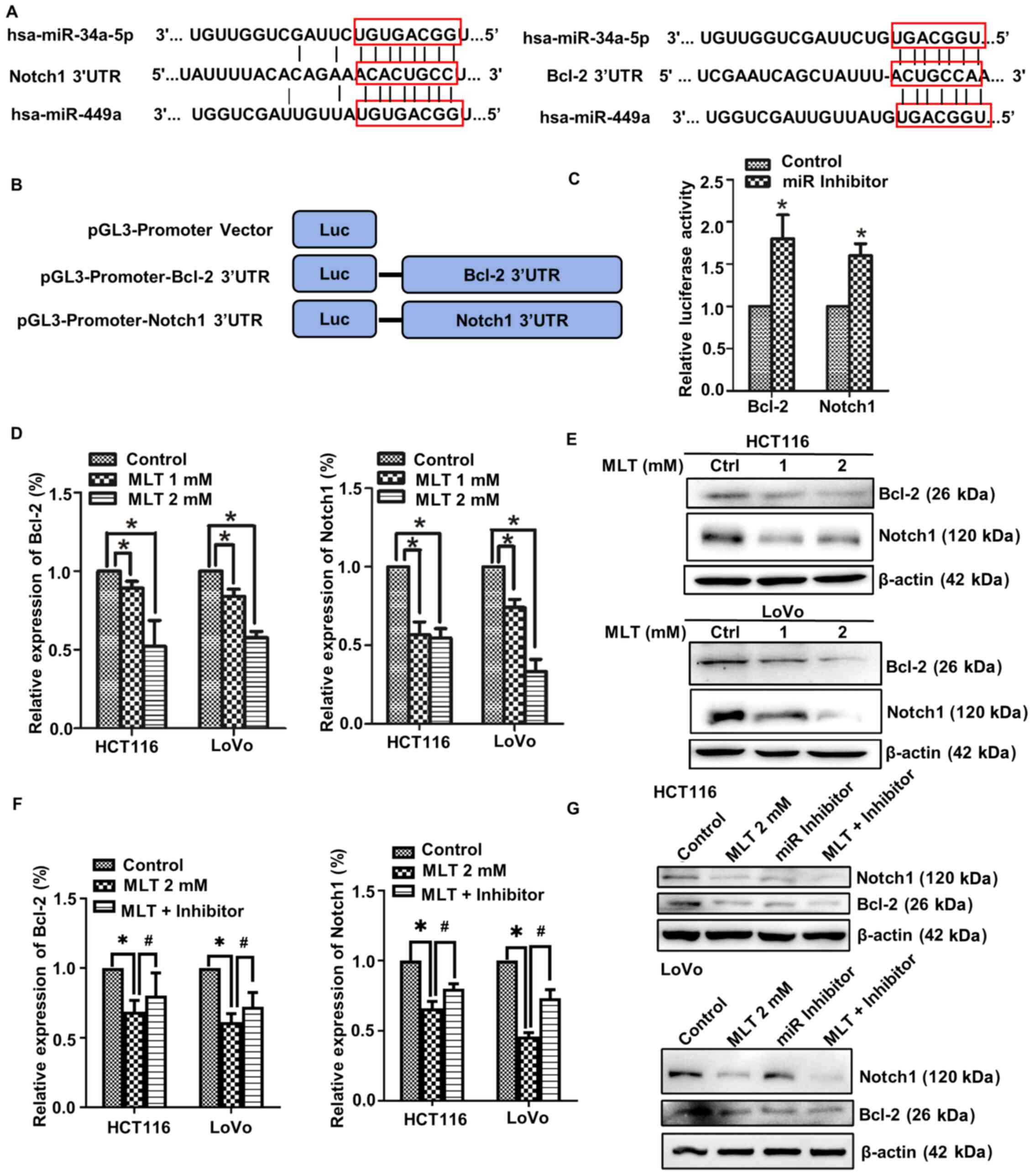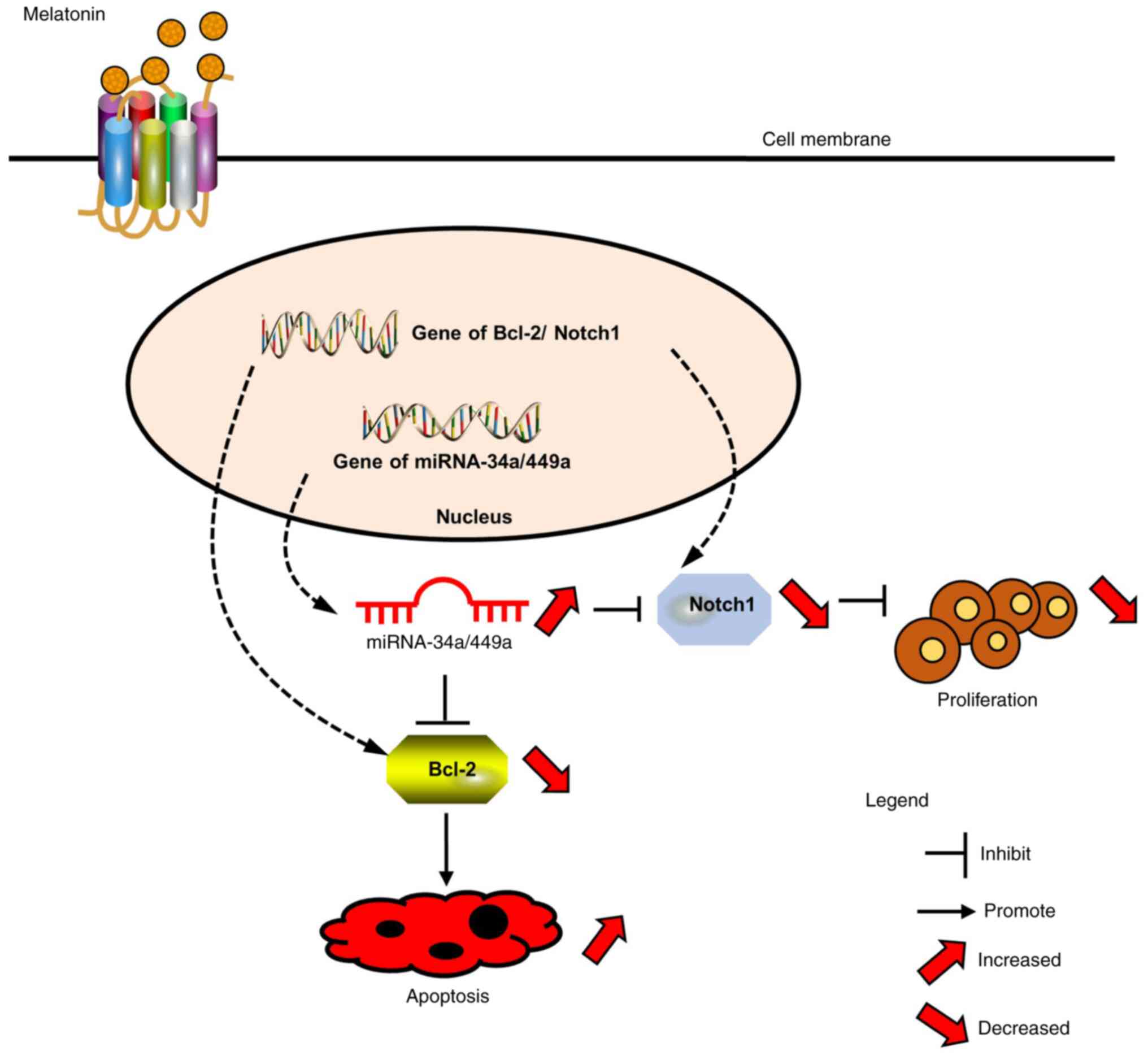|
1
|
Chen W, Zheng R, Baade PD, Zhang S, Zeng
H, Bray F, Jemal A, Yu XQ and He J: Cancer statistics in China,
2015. CA Cancer J Clin. 66:115–132. 2016. View Article : Google Scholar : PubMed/NCBI
|
|
2
|
Siegel RLM, Miller KD and Jemal A: Cancer
statistics, 2020. CA Cancer J Clin. 70:7–30. 2020. View Article : Google Scholar : PubMed/NCBI
|
|
3
|
Zhang Y, Chen Z and Li J: The current
status of treatment for colorectal cancer in China: A systematic
review. Medicine (Baltimore). 96:e82422017. View Article : Google Scholar : PubMed/NCBI
|
|
4
|
Scholefield JH and Steele RJ; British
Society For Gastroenterology; Association of Coloproctology for
Great Britain and Ireland, : Guidelines for follow up after
resection of colorectal cancer. Gut. 51 (Suppl 5):V3–V5. 2002.
View Article : Google Scholar : PubMed/NCBI
|
|
5
|
Cunningham D, Humblet Y, Siena S, Khayat
D, Bleiberg H, Santoro A, Bets D, Mueser M, Harstrick A, Verslype
C, et al: Cetuximab monotherapy and cetuximab plus irinotecan in
irinotecan-refractory metastatic colorectal cancer. N Engl J Med.
351:337–345. 2004. View Article : Google Scholar : PubMed/NCBI
|
|
6
|
Van Cutsem E, Peeters M, Siena S, Humblet
Y, Hendlisz A, Neyns B, Canon JL, Van Laethem JL, Maurel J,
Richardson G, et al: Open-label phase III trial of panitumumab plus
best supportive care compared with best supportive care alone in
patients with chemotherapy-refractory metastatic colorectal cancer.
J Clin Oncol. 25:1658–1664. 2007. View Article : Google Scholar : PubMed/NCBI
|
|
7
|
Wu H, Liu J, Yin Y, Zhang D, Xia P and Zhu
G: Therapeutic opportunities in colorectal cancer: Focus on
melatonin antioncogenic action. BioMed Res Int. 2019:97405682019.
View Article : Google Scholar : PubMed/NCBI
|
|
8
|
Claustrat B, Brun J and Chazot G: The
basic physiology and pathophysiology of melatonin. Sleep Med Rev.
9:11–24. 2005. View Article : Google Scholar : PubMed/NCBI
|
|
9
|
Acuña-Castroviejo D, Escames G, Venegas C,
Díaz-Casado ME, Lima-Cabello E, López LC, Rosales-Corral S, Tan DX
and Reiter RJ: Extrapineal melatonin: Sources, regulation, and
potential functions. Cell Mol Life Sci. 71:2997–3025. 2014.
View Article : Google Scholar : PubMed/NCBI
|
|
10
|
Bubenik GA: Gastrointestinal melatonin:
Localization, function, and clinical relevance. Dig Dis Sci.
47:2336–2348. 2002. View Article : Google Scholar : PubMed/NCBI
|
|
11
|
Reiter RJ; RJ R, : Melatonin: The chemical
expression of darkness. Mol Cell Endocrinol. 79:C153–C158. 1991.
View Article : Google Scholar : PubMed/NCBI
|
|
12
|
Reiter RJ, Tan DX, Mayo JC, Sainz RM, Leon
J and Czarnocki Z: Melatonin as an antioxidant: biochemical
mechanisms and pathophysiological implications in humans. Acta
Biochim Pol. 50:1129–1146. 2003. View Article : Google Scholar : PubMed/NCBI
|
|
13
|
Min KJ, Jang JH and Kwon TK: Inhibitory
effects of melatonin on the lipopolysaccharide-induced CC chemokine
expression in BV2 murine microglial cells are mediated by
suppression of Akt-induced NF-κB and STAT/GAS activity. J Pineal
Res. 52:296–304. 2012. View Article : Google Scholar : PubMed/NCBI
|
|
14
|
Joo SS and Yoo YM: Melatonin induces
apoptotic death in LNCaP cells via p38 and JNK pathways:
Therapeutic implications for prostate cancer. J Pineal Res.
47:8–14. 2009. View Article : Google Scholar : PubMed/NCBI
|
|
15
|
Zha L, Fan L, Sun G, Wang H, Ma T, Zhong F
and Wei W: Melatonin sensitizes human hepatoma cells to endoplasmic
reticulum stress-induced apoptosis. J Pineal Res. 52:322–331. 2012.
View Article : Google Scholar : PubMed/NCBI
|
|
16
|
Ren W, Wang P, Yan J, Liu G, Zeng B,
Hussain T, Peng C, Yin J, Li T, Wei H, et al: Melatonin alleviates
weanling stress in mice: Involvement of intestinal microbiota. J
Pineal Res. Dec 20–2017.(Epub ahead of print). doi:
10.1111/jpi.12448.
|
|
17
|
Yin J, Li Y, Han H, Chen S, Gao J, Liu G,
Wu X, Deng J, Yu Q, Huang X, et al: Melatonin reprogramming of gut
microbiota improves lipid dysmetabolism in high-fat diet-fed mice.
J Pineal Res. 65:e125242018. View Article : Google Scholar : PubMed/NCBI
|
|
18
|
Kannen V, Marini T, Zanette DL, Frajacomo
FT, Silva GE Jr, Silva WA Jr and Garcia SB: The melatonin action on
stromal stem cells within pericryptal area in colon cancer model
under constant light. Biochem Biophys Res Commun. 405:593–598.
2011. View Article : Google Scholar : PubMed/NCBI
|
|
19
|
Wang J, Guo W, Chen W, Yu W, Tian Y, Fu L,
Shi D, Tong B, Xiao X, Huang W, et al: Melatonin potentiates the
antiproliferative and pro-apoptotic effects of ursolic acid in
colon cancer cells by modulating multiple signaling pathways. J
Pineal Res. 54:406–416. 2013. View Article : Google Scholar : PubMed/NCBI
|
|
20
|
Anisimov VN: Light pollution, reproductive
function and cancer risk. Neuro Endocrinol Lett. 27:35–52.
2006.PubMed/NCBI
|
|
21
|
Anisimov VN, Vinogradova IA, Panchenko AV,
Popovich IG and Zabezhinski MA: Light-at-night-induced circadian
disruption, cancer and aging. Curr Aging Sci. 5:170–177. 2012.
View Article : Google Scholar : PubMed/NCBI
|
|
22
|
Riabykh TP, Nikolaeva TG and Bodrova NB:
Effects of biorhythm regulator melatonin on DNA synthesis in
short-term cultures of human malignant tumors. Vestn Ross Akad Med
Nauk. 8:30–33. 2000.(In Russian).
|
|
23
|
Farriol M, Venereo Y, Orta X, Castellanos
JM and Segovia-Silvestre T: In vitro effects of melatonin on cell
proliferation in a colon adenocarcinoma line. J Appl Toxicol.
20:21–24. 2000. View Article : Google Scholar : PubMed/NCBI
|
|
24
|
Anisimov VN, Popovich IG and Zabezhinski
MA: Melatonin and colon carcinogenesis: I. Inhibitory effect of
melatonin on development of intestinal tumors induced by
1,2-dimethylhydrazine in rats. Carcinogenesis. 18:1549–1553. 1997.
View Article : Google Scholar : PubMed/NCBI
|
|
25
|
Hong Y, Won J, Lee Y, Lee S, Park K, Chang
KT and Hong Y: Melatonin treatment induces interplay of apoptosis,
autophagy, and senescence in human colorectal cancer cells. J
Pineal Res. 56:264–274. 2014. View Article : Google Scholar : PubMed/NCBI
|
|
26
|
León J, Casado J, Sergio M, Ruiz J, Zurita
MS, González-Puga C, Rejón JD, Gila A, Muñoz de Rueda P, Pavón EJ,
et al: Melatonin reduces endothelin-1 expression and secretion in
colon cancer cells through the inactivation of FoxO-1 and
NF-kappaβ. J Pineal Res. 56:415–426. 2014. View Article : Google Scholar : PubMed/NCBI
|
|
27
|
Yu X, Zheng H, Chan MT and Wu WK:
Modulation of chemoresponsiveness to platinum-based agents by
microRNAs in cancer. Am J Cancer Res. 7:1769–1778. 2017.PubMed/NCBI
|
|
28
|
Dacosta C and Bao Y: The role of MicroRNAs
in the chemopreventive activity of sulforaphane from cruciferous
vegetables. Nutrients. 9:9022017. View Article : Google Scholar
|
|
29
|
Cochetti G, Rossi de Vermandois JA, Maulà
V, Giulietti M, Cecati M, Del Zingaro M, Cagnani R, Suvieri C,
Paladini A and Mearini E: Role of miRNAs in prostate cancer: Do we
really know everything? Urol Oncol. 38:623–635. 2020. View Article : Google Scholar : PubMed/NCBI
|
|
30
|
Shibuya H, Iinuma H, Shimada R, Horiuchi A
and Watanabe T: Clinicopathological and prognostic value of
microRNA-21 and microRNA-155 in colorectal cancer. Oncology.
79:313–320. 2010. View Article : Google Scholar : PubMed/NCBI
|
|
31
|
Liu L, Chen L, Xu Y, Li R and Du X:
microRNA-195 promotes apoptosis and suppresses tumorigenicity of
human colorectal cancer cells. Biochem Biophys Res Commun.
400:236–240. 2010. View Article : Google Scholar : PubMed/NCBI
|
|
32
|
Lu TX and Rothenberg ME: MicroRNA. J
Allergy Clin Immunol. 141:1202–1207. 2018. View Article : Google Scholar : PubMed/NCBI
|
|
33
|
Wong TS, Man OY, Tsang CM, Tsao SW, Tsang
RK, Chan JY, Ho WK, Wei WI and To VS: MicroRNA let-7 suppresses
nasopharyngeal carcinoma cells proliferation through downregulating
c-Myc expression. J Cancer Res Clin Oncol. 137:415–422. 2011.
View Article : Google Scholar : PubMed/NCBI
|
|
34
|
Kang L, Mao J, Tao Y, Song B, Ma W, Lu Y,
Zhao L, Li J, Yang B and Li L: MicroRNA-34a suppresses the breast
cancer stem cell-like characteristics by downregulating Notch1
pathway. Cancer Sci. 106:700–708. 2015. View Article : Google Scholar : PubMed/NCBI
|
|
35
|
Godlewski J, Nowicki MO, Bronisz A,
Williams S, Otsuki A, Nuovo G, Raychaudhury A, Newton HB, Chiocca
EA and Lawler S: Targeting of the Bmi-1 oncogene/stem cell renewal
factor by microRNA-128 inhibits glioma proliferation and
self-renewal. Cancer Res. 68:9125–9130. 2008. View Article : Google Scholar : PubMed/NCBI
|
|
36
|
Wang YB, Zhao XH, Li G, Zheng JH and Qiu
W: MicroRNA-184 inhibits proliferation and promotes apoptosis of
human colon cancer SW480 and HCT116 cells by downregulating C-MYC
and BCL-2. J Cell Biochem. 119:1702–1715. 2018. View Article : Google Scholar : PubMed/NCBI
|
|
37
|
Li M, Yang Y, Kuang Y, Gan X, Zeng W, Liu
Y and Guan H: miR-365 induces hepatocellular carcinoma cell
apoptosis through targeting Bcl-2. Exp Ther Med. 13:2279–2285.
2017. View Article : Google Scholar : PubMed/NCBI
|
|
38
|
Tong Z, Liu N, Lin L, Guo X, Yang D and
Zhang Q: miR-125a-5p inhibits cell proliferation and induces
apoptosis in colon cancer via targeting BCL2, BCL2L12 and MCL1.
Biomed Pharmacother. 75:129–136. 2015. View Article : Google Scholar : PubMed/NCBI
|
|
39
|
Rodriguez A, Griffiths-Jones S, Ashurst JL
and Bradley A: Identification of mammalian microRNA host genes and
transcription units. Genome Res. 14:1902–1910. 2004. View Article : Google Scholar : PubMed/NCBI
|
|
40
|
Tang H, Bian Y, Tu C, Wang Z, Yu Z, Liu Q,
Xu G, Wu M and Li G: The miR-183/96/182 cluster regulates oxidative
apoptosis and sensitizes cells to chemotherapy in gliomas. Curr
Cancer Drug Targets. 13:221–231. 2013. View Article : Google Scholar : PubMed/NCBI
|
|
41
|
Altuvia Y, Landgraf P, Lithwick G, Elefant
N, Pfeffer S, Aravin A, Brownstein MJ, Tuschl T and Margalit H:
Clustering and conservation patterns of human microRNAs. Nucleic
Acids Res. 33:2697–2706. 2005. View Article : Google Scholar : PubMed/NCBI
|
|
42
|
Weber MJ: New human and mouse microRNA
genes found by homology search. FEBS J. 272:59–73. 2005. View Article : Google Scholar : PubMed/NCBI
|
|
43
|
Zhu C, Huang Q and Zhu H: Melatonin
inhibits the proliferation of gastric cancer cells through
Regulating the miR-16-5p-Smad3 pathway. DNA Cell Biol. 37:244–252.
2018. View Article : Google Scholar : PubMed/NCBI
|
|
44
|
Sohn EJ, Won G, Lee J, Lee S and Kim SH:
Upregulation of miRNA3195 and miRNA374b mediates the
anti-angiogenic properties of melatonin in hypoxic PC-3 prostate
cancer cells. J Cancer. 6:19–28. 2015. View Article : Google Scholar : PubMed/NCBI
|
|
45
|
Gu J, Lu Z, Ji C, Chen Y, Liu Y, Lei Z,
Wang L, Zhang HT and Li X: Melatonin inhibits proliferation and
invasion via repression of miRNA-155 in glioma cells. Biomed
Pharmacother. 93:969–975. 2017. View Article : Google Scholar : PubMed/NCBI
|
|
46
|
Messner M, Huether G, Lorf T, Ramadori G
and Schwörer H: Presence of melatonin in the human
hepatobiliary-gastrointestinal tract. Life Sci. 69:543–551. 2001.
View Article : Google Scholar : PubMed/NCBI
|
|
47
|
Claustrat B and Leston J: Melatonin:
Physiological effects in humans. Neurochirurgie. 61:77–84. 2015.
View Article : Google Scholar : PubMed/NCBI
|
|
48
|
Hong Y, Won J, Lee Y, Lee S, Park K, Chang
KT and Hong Y: Melatonin treatment induces interplay of apoptosis,
autophagy, and senescence in human colorectal cancer cells. J
Pineal Res. 56:264–274. 2014. View Article : Google Scholar : PubMed/NCBI
|
|
49
|
Park SY, Jang WJ, Yi EY, Jang JY, Jung Y,
Jeong JW and Kim YJ: Melatonin suppresses tumor angiogenesis by
inhibiting HIF-1a stabilization under hypoxia. J Pineal Res.
48:178–184. 2010. View Article : Google Scholar : PubMed/NCBI
|
|
50
|
Xu M, Chen X, Lin K, Zeng K, Liu X, Pan B,
Xu X, Xu T, Hu X, Sun L, et al: The long noncoding RNA SNHG1
regulates colorectal cancer cell growth through interactions with
EZH2 and miR-154-5p. Mol Cancer. 17:1412018. View Article : Google Scholar : PubMed/NCBI
|
|
51
|
Zhao SJ, Shen YF, Li Q, He YJ, Zhang YK,
Hu LP, Jiang YQ, Xu NW, Wang YJ, Li J, et al: SLIT2/ROBO1 axis
contributes to the Warburg effect in osteosarcoma through
activation of SRC/ERK/c-MYC/PFKFB2 pathway. Cell Death Dis.
9:3902018. View Article : Google Scholar : PubMed/NCBI
|
|
52
|
Livak KJS and Schmittgen TD: Analysis of
relative gene expression data using real-time quantitative PCR and
the 2(-Delta Delta C(T)) method. Methods. 25:402–408. 2001.
View Article : Google Scholar : PubMed/NCBI
|
|
53
|
Yang CY, Lin CK, Tsao CH, Hsieh CC, Lin
GJ, Ma KH, Shieh YS, Sytwu HK and Chen YW: Melatonin exerts
anti-oral cancer effect via suppressing LSD1 in patient-derived
tumor xenograft models. Oncotarget. 8:33756–33769. 2017. View Article : Google Scholar : PubMed/NCBI
|
|
54
|
Wang Q, Sun Z, Du L, Xu C, Wang Y, Yang B,
He N, Wang J, Ji K, Liu Y, et al: Melatonin sensitizes human
colorectal cancer cells to γ-ray ionizing radiation in vitro and in
vivo. Int J Mol Sci. 19:39742018. View Article : Google Scholar
|
|
55
|
Marques JH, Mota AL, Oliveira JG, Lacerda
JZ, Stefani JP, Ferreira LC, Castro TB, Aristizábal-Pachón AF and
Zuccari DA: Melatonin restrains angiogenic factors in
triple-negative breast cancer by targeting miR-152-3p: In vivo and
in vitro studies. Life Sci. 208:131–138. 2018. View Article : Google Scholar : PubMed/NCBI
|
|
56
|
Hong YG, Xin C, Zheng H, Huang ZP, Yang Y,
Zhou JD, Gao XH, Hao L, Liu QZ, Zhang W, et al: miR-365a-3p
regulates ADAM10-JAK-STAT signaling to suppress the growth and
metastasis of colorectal cancer cells. J Cancer. 11:3634–3644.
2020. View Article : Google Scholar : PubMed/NCBI
|
|
57
|
Wu J, Wu G, Lv L, Ren YF, Zhang XJ, Xue
YF, Li G, Lu X, Sun Z and Tang KF: MicroRNA-34a inhibits migration
and invasion of colon cancer cells via targeting to Fra-1.
Carcinogenesis. 33:519–528. 2012. View Article : Google Scholar : PubMed/NCBI
|
|
58
|
Cekaite P, Eide PW, Lind GE, Skotheim RI
and Lothe RA: MicroRNAs as growth regulators, their function and
biomarker status in colorectal cancer. Oncotarget. 7:6476–6505.
2015. View Article : Google Scholar
|
|
59
|
Lv J, Zhang Z, Pan L and Zhang Y:
MicroRNA-34/449 family and viral infections. Virus Res. 260:1–6.
2019. View Article : Google Scholar : PubMed/NCBI
|
|
60
|
Sørensen NM, Schrohl AS, Jensen V,
Christensen IJ, Nielsen HJ and Brünner N: Comparative studies of
tissue inhibitor of metalloproteinases-1 in plasma, serum and
tumour tissue extracts from patients with primary colorectal
cancer. Scand J Gastroenterol. 43:186–191. 2008. View Article : Google Scholar : PubMed/NCBI
|
|
61
|
Schwartz RN: Management of early and
advanced colorectal cancer: Therapeutic issues. Am J Health Syst
Pharm. 65 (Suppl 4):S8–S14; quiz S22-S24. 2008. View Article : Google Scholar : PubMed/NCBI
|
|
62
|
Half E and Arber N: Colon cancer:
Preventive agents and the present status of chemoprevention. Expert
Opin Pharmacother. 10:211–219. 2009. View Article : Google Scholar : PubMed/NCBI
|
|
63
|
Cipolla-Neto J and Amaral FGD: Melatonin
as a hormone: New physiological and clinical insights. Endocr Rev.
39:990–1028. 2018. View Article : Google Scholar : PubMed/NCBI
|
|
64
|
Chitimus DM, Popescu MR, Voiculescu SE,
Panaitescu AM, Pavel B, Zagrean L and Zagrean AM: Melatonin's
impact on antioxidative and anti-inflammatory reprogramming in
homeostasis and disease. Biomolecules. 10:12112020. View Article : Google Scholar
|
|
65
|
Zhang S, Qi Y, Zhang H, He W, Zhou Q, Gui
S and Wang Y: Melatonin inhibits cell growth and migration, but
promotes apoptosis in gastric cancer cell line, SGC7901. Biotech
Histochem. 88:281–289. 2013. View Article : Google Scholar : PubMed/NCBI
|
|
66
|
Li Y, Li S, Zhou Y, Meng X, Zhang JJ, Xu
DP and Li HB: Melatonin for the prevention and treatment of cancer.
Oncotarget. 8:39896–39921. 2017. View Article : Google Scholar : PubMed/NCBI
|
|
67
|
Batista AP, da Silva TG, Teixeira AA, de
Medeiros PL, Teixeira VW, Alves LC, Dos Santos FA and Silva EC:
Ultrastructural aspects of melatonin cytotoxicity on Caco-2 cells
in vitro. Micron. 59:17–23. 2014. View Article : Google Scholar : PubMed/NCBI
|
|
68
|
León J, Casado J, Jiménez Ruiz SM, Zurita
MS, González-Puga C, Rejón JD, Gila A, Muñoz de Rueda P, Pavón EJ,
Reiter RJ, et al: Melatonin reduces endothelin-1 expression and
secretion in colon cancer cells through the inactivation of FoxO-1
and NF-κβ. J Pineal Res. 56:415–426. 2014. View Article : Google Scholar : PubMed/NCBI
|
|
69
|
Liu Z, Zou D, Yang X, Xue X, Zuo L, Zhou
Q, Hu R and Wang Y: Melatonin inhibits colon cancer RKO cell
migration by downregulating Rho associated protein kinase
expression via the p38/MAPK signaling pathway. Mol Med Rep.
16:9383–9392. 2017. View Article : Google Scholar : PubMed/NCBI
|
|
70
|
Wei JY, Li WM, Zhou LL, Lu QN and He W:
Melatonin induces apoptosis of colorectal cancer cells through
HDAC4 nuclear import mediated by CaMKII inactivation. J Pineal Res.
58:429–438. 2015. View Article : Google Scholar : PubMed/NCBI
|
|
71
|
Trivedi PP, Jena GB, Tikoo KB and Kumar V:
Melatonin modulated autophagy and Nrf2 signaling pathways in mice
with colitis-associated colon carcinogenesis. Mol Carcinog.
55:255–267. 2016. View Article : Google Scholar : PubMed/NCBI
|
|
72
|
Zhang X, Pan Y, Fu H and Zhang J:
microRNA-205 and microRNA-338-3p reduces cell apoptosis in prostate
carcinoma tissue and LNCaP prostate carcinoma cells by directly
targeting the B-cell lymphoma-2 (Bcl-2) gene. Med Sci Monit.
25:1122–1132. 2019. View Article : Google Scholar : PubMed/NCBI
|
|
73
|
Hongdan L and Feng L: miR-3120-5p promotes
colon cancer stem cell stemness and invasiveness through targeting
Axin2. Biochem Biophys Res Commun. 496:302–308. 2018. View Article : Google Scholar : PubMed/NCBI
|
|
74
|
Kim TH and Cho SG: Melatonin-induced KiSS1
expression inhibits triple-negative breast cancer cell
invasiveness. Oncol Lett. 14:2511–2516. 2017. View Article : Google Scholar : PubMed/NCBI
|
|
75
|
Farooqi AA, Tabassum S and Ahmad A:
MicroRNA-34a: A versatile regulator of myriads of targets in
different cancers. Int J Mol Sci. 18:2082017. View Article : Google Scholar
|
|
76
|
Li XJ, Ren ZJ and Tang JH: MicroRNA-34a: A
potential therapeutic target in human cancer. Cell Death Dis.
5:e13272014. View Article : Google Scholar : PubMed/NCBI
|
|
77
|
Zhang C, Mo R, Yin B, Zhou L, Liu Y and
Fan J: Tumor suppressor microRNA-34a inhibits cell proliferation by
targeting Notch1 in renal cell carcinoma. Oncol Lett. 7:1689–1694.
2014. View Article : Google Scholar : PubMed/NCBI
|
|
78
|
Yu X, Zhang W, Ning Q and Luo X:
MicroRNA-34a inhibits human brain glioma cell growth by
down-regulation of Notch1. J Huazhong Univ Sci Technolog Med Sci.
32:370–374. 2012. View Article : Google Scholar : PubMed/NCBI
|
|
79
|
Zhang X, Ai F, Li X, Tian L, Wang X, Shen
S and Liu F: MicroRNA-34a suppresses colorectal cancer metastasis
by regulating Notch signaling. Oncol Lett. 14:2325–2333. 2017.
View Article : Google Scholar : PubMed/NCBI
|
|
80
|
Tazawa H, Tsuchiya N, Izumiya M and
Nakagama H: Tumor-suppressive miR-34a induces senescence-like
growth arrest through modulation of the E2F pathway in human colon
cancer cells. Proc Natl Acad Sci USA. 104:15472–15477. 2007.
View Article : Google Scholar : PubMed/NCBI
|
|
81
|
Lindner AU, Salvucci M, Morgan C, Monsefi
N, Resler AJ, Cremona M, Curry S, Toomey S, O'Byrne R, Bacon O, et
al: BCL-2 system analysis identifies high-risk colorectal cancer
patients. Gut. 66:2141–2148. 2017. View Article : Google Scholar : PubMed/NCBI
|
|
82
|
Ishiguro H, Okubo T, Kuwabara Y, Kimura M,
Mitsui A, Sugito N, Ogawa R, Katada T, Tanaka T, Shiozaki M, et al:
NOTCH1 activates the Wnt/β-catenin signaling pathway in colon
cancer. Oncotarget. 8:60378–60389. 2017. View Article : Google Scholar : PubMed/NCBI
|
|
83
|
Ramesh P and Medema JP: BCL-2 family
deregulation in colorectal cancer: Potential for BH3 mimetics in
therapy. Apoptosis. 25:305–320. 2020. View Article : Google Scholar : PubMed/NCBI
|
|
84
|
Li X, Zhong X, Pan X and Ji Y: Tumor
suppressive microRNA-708 targets Notch1 to suppress cell
proliferation and invasion in gastric cancer. Oncol Res.
26:1317–1326. 2018. View Article : Google Scholar : PubMed/NCBI
|
|
85
|
Wang X, Xie Y and Wang J: [ARTICLE
WITHDRAWN] Overexpression of microRNA-34a-5p inhibits proliferation
and promotes apoptosis of human cervical cancer cells by
downregulation of Bcl-2. Oncol Res. 26:977–985. 2018. View Article : Google Scholar : PubMed/NCBI
|















